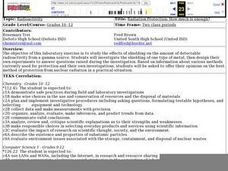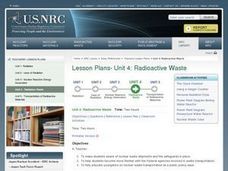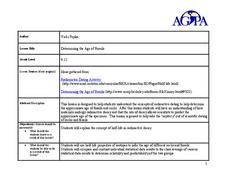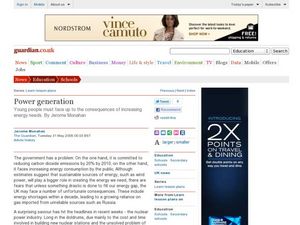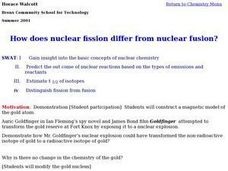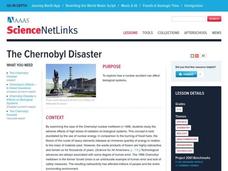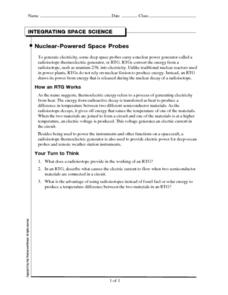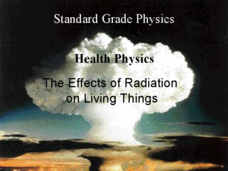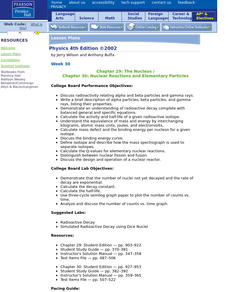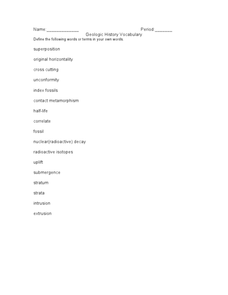CK-12 Foundation
Marie Curie's Classroom
What makes some elements stable and others radioactive? Scholars adjust the number of protons and neutrons in an element then observe its decay. The simulation includes a graphical representation and the chemical formula, as well as...
Curated OER
The Building Blocks
This PowerPoint is a comprehensive review of all the facts related to an atom's basic structure and function. What makes this unique is that it is geared toward an audience of junior geologists. After introducing the periodic table of...
Curated OER
RADIATION PROTECTION: HOW MUCH IS ENOUGH?
Young scholars study the effects of shielding on the amount of detectable radioactivity from a gamma source. They investigate the shielding of one type of metal, then design their own experiments to answer questions raised during the...
Curated OER
Radioactive Waste
Students assemble a nuclear waste cube to represent the amount of waste from one person over a period of 20 years that would be left after all stable materials had been recycled. They discuss current methods of containing waste.
Curated OER
The Chernobyl Accident
Fifth graders see that the Chernobyl Accident of 1986 was caused by a poorly developed experiment in a nuclear power plant. They explain the purpose of a nuclear power plant and determine the health effects that radioactivity causes.
Curated OER
Chernobyl 1 - Radiation Released
Students investigate the Chernobyl nuclear disaster by mapping out the winds carrying radiation and viewing a short video about the aftermath and subsequent health problems. They then calculate the amount of radiation that people were...
Curated OER
Determining the Age of Fossils
Students examine the concept of radioactive dating. In this radioactive dating lesson plan, students investigate how to determine the ages of fossils and rocks as they learn about half-life radioactive decay.
Curated OER
Problem Based Inquiry Learning
Tenth graders research Nuclear Energy and Radioactivity, how is this form of energy used for the good of mankind in solving the energy crisis and the hazardous aspect of using this form of energy. They cooperatively work in groups to...
Curated OER
Energy from Atoms
In this energy from atoms worksheet, students match 10 sentences to given terms related to nuclear energy, electricity, fission, and nuclear reactions. They also answer 3 questions about nuclear waste and atomic reactions.
Curated OER
Power Generation
Young scholars examine energy issues. In this environmental stewardship activity, students discuss nuclear power options. Young scholars also discuss energy consumption and create energy reduction guides for students their own age. Many...
Curated OER
Not In My Backyard: The Nature and Danger of Nuclear Radiation
Students evaluate the ways to control exposure to radiation and determine how to deal with the problem of nuclear waste in a rational rather than an emotional way.
Curated OER
Nuclear Power
In this nuclear power worksheet, students compare fission and fusion. Students learn about the different kinds of radiation. This worksheet has 2 short answer questions and 10 matching questions.
Curated OER
Chapter 22 - 25 Review
For this chemistry review worksheet, students explore their knowledge of solutions, acid and bases, nuclear reactions, and radioactive decay as they answer 33 matching, fill in the blank, and short answer questions.
Curated OER
Nuclear Fusion
In this nuclear fusion instructional activity, students look at the energy released when nuclear fusion occurs. Students determine how scientists are trying to harness fusion to produce electricity. This instructional activity has 3 fill...
Curated OER
How does Nuclear Fission differ from Nuclear Fusion?
Students examine concepts of nuclear chemistry. They compare and contrast the topics of nuclear fission and nuclear fision. They predict the outcome of reactions based on the types of emissions and reactants.
Curated OER
THE CHERNOBYL DISASTER
Students explore how a nuclear accident can affect biological systems. They examine the case of the Chernobyl nuclear meltdown in 1986.
Curated OER
Nuclear-Powered Space Probes
In this space probes worksheet, students read about radioisotope thermoelectric generators and how they work. Then students complete 3 short answer questions.
American Institute of Physics
African Americans and the Manhattan Project
A lesson about the Manhattan Project will explode young physicists' understanding of the racial attitudes in the United States during and after World war II. Groups select an African American scientist or technician that worked on the...
Curated OER
Working with Half-Life
In this half-life instructional activity, students use a given table of half lives, mass, time and amount of original sample to solve for unknowns in nine given half-life problems.
Curated OER
Health Physics: The Effects of Radiation on Living Things
A mix of scientific details and background information about the well-known sites of radiation attacks or accidents. This topic may open up details that you may consider as sensitive, and could be upsetting to some pupils. This is a...
Curated OER
The Nucleus
In this atoms worksheet, students review terms associated with atoms which includes isotopes, transmutation, and radioactive decay. This worksheet has 11 short answer questions.
Curated OER
SURVIVING A COSMIC INVASION
Young scholars read periodicals relating to radioacitivity and interpret a Geiger Counter. They work in small groups, share information and help each other explain the Geiger Counter. They discover the relationship distance to...
Curated OER
The Nucleus / Nuclear Reactions and Elementary Particles
Students describe how radioactivity relates to alpha and beta particles. Using their properties, they write a descriptive paper about the gamma rays and alpha and beta particles. They calculate q-values and the half-life of a given...
Curated OER
Geological History Vocabulary
In this geological history worksheet, learners define 17 terms associated with index fossils, nuclear decay, and radioactive decay.




